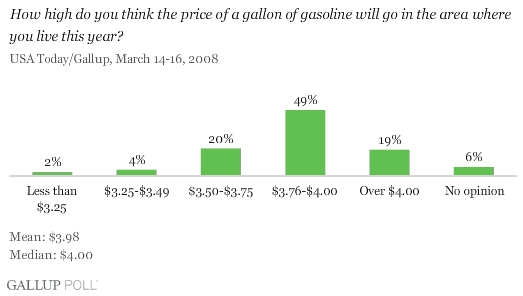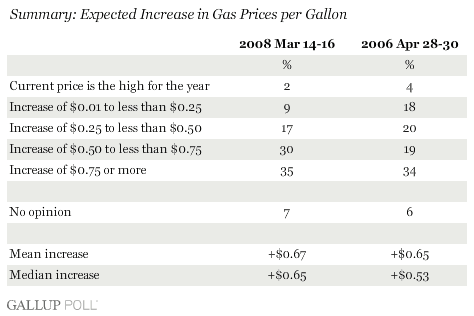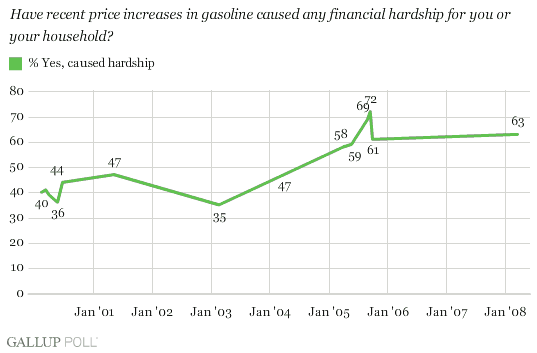PRINCETON, NJ -- Americans predict gas prices in their area will hit $3.98 a gallon this year.

Gas Prices Are Creating Financial Hardship
A new USA Today/Gallup Poll, conducted March 14-16, 2008, shows increasing gas prices are creating financial hardship for nearly two in three American families. However, the poll also suggests that the current degree of financial hardship has yet to reach post-Katrina levels.
As Hurricane Katrina was devastating New Orleans and parts of the Gulf Coast in August 2005, Americans reported paying an average of $2.65 for a gallon of gas. The percentage of Americans saying they were experiencing financial hardship as a result of increasing gas prices surged from 59% in May 2005 to 69% in late August 2005, and then to 72% in mid-September 2005. While Americans report paying a much higher $3.30 on average for a gallon of gas in March 2008, 63% say they are currently experiencing financial hardship as a result of increasing gas prices.
So why are fewer Americans reporting that gas prices are causing them financial hardship today compared to late August and mid-September 2005, when the gas prices Americans currently report paying are about 25% higher than they reported then? In part, consumers may be adjusting somewhat, at least psychologically, to today's much higher gas prices. Of course, it is possible that some Americans have also adjusted their lifestyles to lessen the impact of higher gas prices on them and their families.
Another reason may involve future price expectations for gas. Following Katrina, gas prices soared and no one seemed to know how high they might go. By now, however, consumers have seen gas prices surge on several occasions. This year, they appear to have developed the expectation, on average, that pump prices are likely to reach $3.98 a gallon, a 21% increase over what they currently report paying. Only 19% of Americans think gas prices will exceed $4 a gallon this year. So while that price represents a huge increase, it may generate less consumer anxiety than a similar increase at a time when the future seemed more uncertain.


Financial Turmoil
While Gallup's polling shows that many factors affect the current consumer psychology as well as consumers' disposable incomes, it seems clear that higher gas prices are causing significant financial hardship. Given expectations that pump prices may well reach $4 a gallon this summer, the current degree of financial hardship is likely to increase in the months ahead.
The Federal Reserve may be able to improve consumer psychology, at least on the margin, by lowering interest rates and making funds more readily available to the mortgage market. Congress and the Treasury may also help to some degree as they send out tax rebates to consumers. However, these efforts seem likely to pale in significance for most consumers when compared to another surge in gas prices in the months ahead. Perhaps once the Treasury and the Congress get finished bailing out the financial sector, they will turn their attention to one of the most regressive taxes being levied on Americans today -- surging gas prices at the pump.
Survey Methods
Results are based on telephone interviews with 1,025 national adults, aged 18 and older, conducted March 14-16, 2008. For results based on the total sample of national adults, one can say with 95% confidence that the maximum margin of sampling error is ±3 percentage points. In addition to sampling error, question wording and practical difficulties in conducting surveys can introduce error or bias into the findings of public opinion polls.
